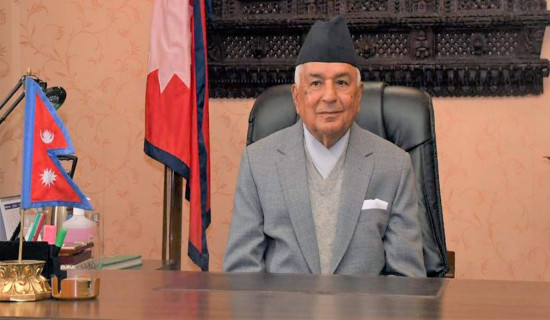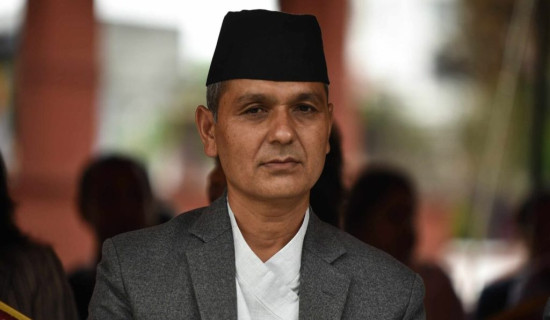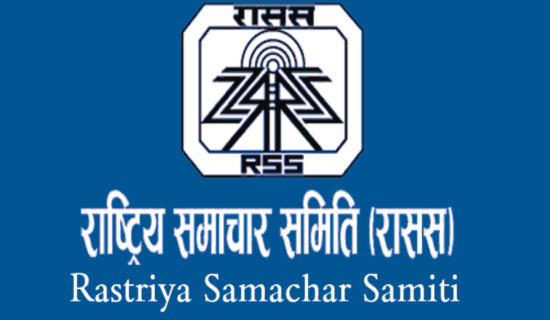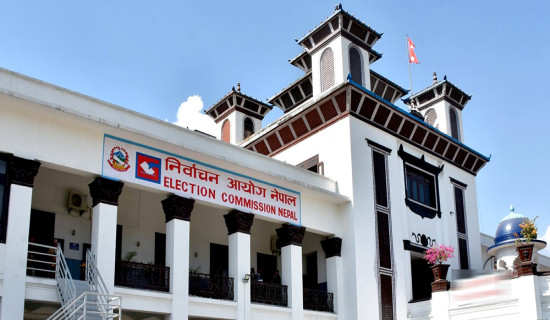- Thursday, 19 February 2026
Sports For Common Good
Pawan Ghimire Simone Galimberti,
At a time when national sports are gaining more and more prominence and their visibility grows with the corporate sector investing considerable resources in national leagues, there is also an opportunity to look at sports differently.
The International Day of Sports for Development and Peace that was held on the 6th of April offers the best platform to celebrate what sports can do to make our society better.
Key Threads
Imagine local communities that are more inclusive, more open, and cleaner, where social bonds are once again re-established as the key threads of our society.
This idyllic vision of reality can be truly achieved and put in place if we truly leverage the magic power that sports can unleash if used for the common good.
Think about what sports could help us accomplish.
For example, a cricket game could become an opportunity for able-bodied and visually impaired athletes to come together and learn from each other.
While able-bodied cricket has considerably grown in the last five to ten years, blind cricket is also advancing, and the male national team will play the Blind T20 World Cup in India in November this year.
Imagine these players, apparently divided by a physical impairment, sharing anecdotes and stories about their successes but also about their failures.
Surely a topic that would turn up in the conversations would be resilience and winning despite the adversities, two issues that players with the national blind cricket teams can surely give a class about because they have been mastering the art of overcoming challenges in and off the court.
Turning to basketball, a sporting discipline that is more and more popular among teenagers thanks to the work done by colleges and schools, few are aware that Nepal counts with a very strong wheelchair basketball movement with the Kathmandu Valley alone hosting almost ten teams and several others are active across the nation.
Readers should know that among these players, there are several who could well play at a global level because wheelchair basketball thrives in the American universities and is played professionally in several European nations.
We could think about a leadership class among basketball players, those living with disabilities and those living without, united to learn how sports can be a "gym" for personal and professional greatness, what we call "good leadership".
In such a conversation we could discuss performance and the indispensable tools to win, in court and off the court, what the mythical college coach John Wooden, would refer to as the key blocks of his pyramid of success.
Industriousness (working hard), friendship, loyalty, cooperation, and enthusiasm are the foundations to bring a team to success, as Coach Wooden always reminded us, it is not necessarily about winning a trophy.
It is not the case that Coach Wooden first considered himself a teacher and he always prioritised the role sports coaches have in shaping their athletes' character.
He said "the coach must never forget that he is, first of all, a teacher. He must continuously be exploring ways to improve himself so that he may improve others and welcome every person and everything that may be helpful to him".
He wrote these lines in the last century when female coaches were not part of the equation. However, the picture is rapidly changing as women have also taken the mantle of a recognised protagonist in the field of sports, and in other domains, despite the existence of still too many disparities.
That's why sports can be an enabler not only for a society that is more inclusive of the right of persons with disability but also a lab to empower women's leadership and development in a such a way that young girls can also emerge and thrive and see a future in their own country. From awareness programmes using sports to bring people to their attention over some of the biggest challenges faced by our planet, for example, climate change, to effective sports coaching practices that support and help vulnerable youth to find their way and a path to a meaningful life, sports is an incubator for actions fostering the common good.
That's why when sports are experiencing a national renaissance, we want to appeal for more investments in positive sports practices that can help Nepal achieve the Agenda 2030 and set itself towards a path of sustainability and inclusion.
Moreover, more sports events at grassroots levels within the community might induce more people to commit to healthier lifestyles, setting the grounds for a more fit population with positive implications for the national health system.
It is encouraging to see some external development partners supporting sports for development and peace but the movement needs more help, in a more coordinated and organised manner. We also need the private sector to step up.
In the past, we had several examples of enlightened corporations, some of them global outreach, that were ready to chip in and that helped a lot but now is no longer enough.
Investing in commercial leagues and other sports events contributes to the overall development of sports in the country.
Yet the truth is that each investment in sports for development and peace is also a multiplier in holistic process of national growth in Nepal, a nation that, as an upcoming lower-middle-income country, can thrive and prosper across all sectors and shine globally. Leadership in government, at all levels, is also paramount and it is encouraging to see how several local level governments are embracing sports for good.
Team Nepal
Team Nepal can reach the highest levels of excellence and not only in the field of sports but in other sectors.
Supporting and financing positive sports practices bring people together and much more.
In addition, such commitment can have them reflect on the greatest problems that their nation faces which can help them enable citizens to take action as their contributions to bring positive changes in society. Good sports disciplines can make a difference here in Nepal. It is such a no brainer.
(Ghimire is chairman - of Cricket Association of the Blind Nepal and treasurer of World Blind Cricket Limited, UK. Galimberti is the Co-Founder of ENGAGE. He can be reached at simone_engage@yahoo.com)

















